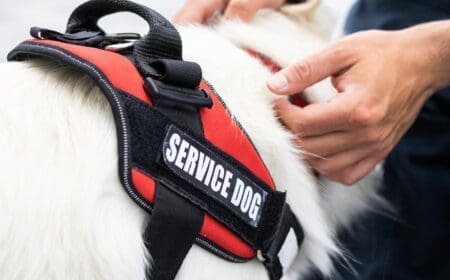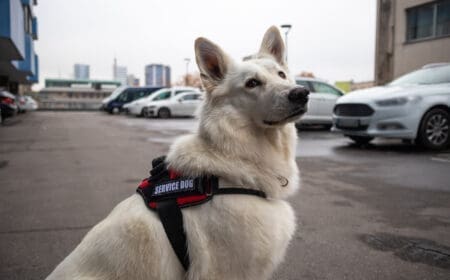Emotional support animals (ESA) are remarkable pets that help individuals dealing with certain mental health conditions or other disabilities. Emotional support animals play a pivotal role in their owner’s lives, providing comfort, support, and routine that help individuals go about their day with greater ease.
Federal laws protect certain ESA rights, and Kansas state laws uphold these regulations. Our guide tells you more about emotional support animal laws, including the essential laws to know about if you want to add one of these amazing companions to your treatment plan.
What Is an Emotional Support Animal in Kansas?
An emotional support animal is a pet that provides comfort and companionship to their owner through their presence alone. Common conditions that emotional support animals are often prescribed to help with include anxiety, depression, and chronic stress, among other disorders.
An emotional support animal can be any pet legally owned in Kansas, and this is not limited to just dogs and cats. Birds, ferrets, Guinea pigs, snakes, and hamsters can all be great emotional support animals for the right person.
Furthermore, emotional support animals accomplish their task without any training. As long as you feel comforted by your pet’s presence and you have a diagnosis from a mental healthcare professional, your pet can qualify to become an emotional support animal in Kansas.
However, you must get an emotional support animal letter from a licensed mental health professional for the law to recognize your pet as an ESA. Without an ESA letter, your pet will be treated as any other pet.
Differences Between ESAs and Service Animals
Emotional support animals and service animals are similar in many ways, but key differences set them apart. While any pet can become your emotional support animal with an ESA letter, only dogs trained to assist an individual with a disability are recognized as service animals.
Some of the common tasks service animals uphold include providing deep pressure therapy to someone experiencing an anxiety attack or creating distractions to prevent a person from engaging in self-harm.
Since such tasks are beyond what emotional support animals can, the law grants service animals more wide-reaching access rights and general protections. Because of the Americans with Disabilities Act (ADA), service animals are permitted to enter any public space their handler can, including public places with a no-pet policy, whereas emotional support animals are not.
Additionally, service animals must only be trained to perform disability-related tasks for their owners; no documentation or paperwork is required for proof of a service animal. On the other hand, an emotional support animal letter is required for your ESA to be legally recognized.
An Overview of Kansas Emotional Support Animal Laws


Kansas state law backs up federal emotional support animal laws and protections. Below, we give you an overview of the most important emotional support animal laws to know about when adding an ESA to your treatment plan in Kansas.
Kansas Emotional Support Animal Public Access Laws
Unfortunately, emotional support animals do not have the same kind of wide-reaching public access rights that service animals do in the state. This is because ESAs are not trained to specificially support an individual by completing tasks to help with their disability; the benefit of an emotional support animal comes from their presence and the routine of taking care of them.
You cannot take your ESA into private businesses, and they may only be allowed in public spaces that accept animals. Keep in mind that if your ESA is non-traditional, such as a hamster or snake, they may not even be allowed in pet-friendly spaces.
If you have any questions or concerns about a business’s public access policies for emotional support animals, make sure to call ahead and keep in mind that your ESA is not legally required to be granted admittance.
Kansas Emotional Support Animal Housing Laws
The Fair Housing Act (FHA) protects the right of individuals with a disability to access fair housing. Individuals with certain health conditions rely on the companionship of their emotional support animals; these animals are more than just pets, and federal law prevents housing providers from discriminating against tenants with an ESA.
Owners with a valid emotional support animal are not required to adhere to any pet restrictions or breed restrictions, and they are not required to pay pet rent, pet fees, or pet security deposits. This is to prevent someone from being unable to afford or obtain housing due to their need for an ESA.
That being said, if your support animal damages or destroys property, you will be liable for these costs.
Keep in mind that your landlord will require a valid ESA letter to verify the status of your emotional support animal. Landlords also have the right to ask for an ESA letter when your lease renews, or on an annual basis. This means you may need your mental health professional to write you a new ESA letter to show your continued need for a companion animal.
ESA Laws for Kansas University Housing
As with any other housing provider, universities must permit emotional support animals. However, it’s up to the university to decide whether or not to allow emotional support animals in the campus buildings.
For example, Kansas University will happily let your emotional support animal live with you in university housing, but ESAs aren’t permitted outside housing areas, including within campus buildings.
While this is Kansas University’s policy, other universities in the state may allow emotional support animals on campus, provided they have a valid ESA letter. Contact your school to find out more about their policies on ESAs on campus.
Take note that individuals who rely on a service animals are allowed to enter the campus and attend classes with their animals, as per the protections outlined in the ADA.
Kansas Emotional Support Animal Air Travel Laws
The Air Carrier Access Act (ACAA) previously governed flying with an emotional support animal. This legislation prohibited airlines from denying entry to emotional support animals and service animals in the cabin with their owners. It also waived the pet fees charged by airlines.
In late 2020, the Department of Transportation updated the Air Carrier Access Act. Since then, airlines can permit emotional support animals in the passenger cabin as they see fit. In most cases, you’ll need to follow the pet policies of the airline when flying with your emotional support animal from or to Kansas, including paying pet fees.
How to Get an ESA Letter in Kansas
Getting an ESA letter in Kansas doesn’t need to be a confusing process. Below, you’ll find a step-by-step guide on getting an ESA letter in the state.
1) Schedule an Appointment With an LMHP
Only a licensed mental health professional (LMHP), be it a therapist or psychiatrist, can write you an emotional support animal letter. To get one for your pet, you must schedule an appointment and attend an evaluation session to discuss your symptoms.
During each session, it’s critical to be honest about your symptoms to help your mental healthcare professional determine if an ESA is right for you. Whether or not they write you an ESA letter is ultimately up to your LMHP, and there’s no guarantee that you will get an ESA letter.
2) Adopt a Pet
If you don’t have a pet but your LMHP determined that an emotional support animal is a good option for your treatment plan, you’ll need to adopt one. When adopting a pet as an emotional support animal, consider everything that goes into the ownership.
Most people with a mental health condition benefit from the presence of an affectionate animal that is not too high maintenance.
Those who want a dog or cat should research what breed would suit their life. Since dogs and cats demand a lot of care from their owners, finding the right breed for your lifestyle and available time is critical in adopting an appropriate emotional support dog or cat.
3) Get Your ESA Letter
Emotional support animal letters include basic information about your pet, such as their breed and size. Once you adopt a pet, you can give the details to your licensed mental health professional to complete your ESA letter.
Your ESA letter will make sure that all the necessary information is included in your letter, and there will be an expiration date included, as well as their signature and professional details. Always keep in mind the expiration date of your ESA letter, as you may need to renew your letter yearly.
Kansas ESA Law FAQs
Below, we’ll answer some commonly asked questions about emotional support animal laws in Kansas.
Can I Use a Kansas ESA Letter in Other States?
No, you can’t use a Kansas-issued ESA letter in other states. Your ESA letter must be written by a mental healthcare professional who is licensed in your state of residence. So, if you move to another state, you’ll have to get a new ESA letter written by a professional licensed in that state.
Can Landlords Deny ESA Letter in Kansas?
For the most part, landlords can’t deny an emotional support animal letter written by a licensed mental health professional. A landlord can only deny an emotional support animal if the pet’s presence causes a health or safety risk.
In some cases, landlords may legally deny ESAs if their presence causes undue hardship, such as property damage or disturbance to other residents, or if the accommodation request is unreasonable, such as a very large dog in a small studio apartment.
Can You Charge a Pet Fee or Deposit for an ESA in Kansas?
The Fair Housing Act prohibits landlords from charging pet fees or deposits for emotional support animals. As ESAs are not considered pets, tenants aren’t required to pay anything extra. However, landlords may charge the tenant if damage is caused to the property by an emotional support animal.
Are ESAs Allowed in Kansas Stores and Restaurants?
In line with the Americans with Disabilities Act, Kansas only gives service animals public access rights. While some Kansas stores and restaurants make exceptions for emotional support animals, they aren’t required by federal or state law. As an ESA owner in Kansas, you must follow the pet policies of the businesses you’re entering.
Wrapping up ESA Laws in Kansas
Adding an emotional support animal to your treatment plan in Kansas can be life changing, and it’s important that you understand the rights that you have with your new ESA in the state.
In general, Kansas upholds the protections outlined in federal legislation for emotional support animals, granting individuals in the state housing accommodation rights.
If you want to discuss adding an emotional support animal to your treatment plan, reach out to a licensed mental healthcare provider in Kansas as soon as possible.




